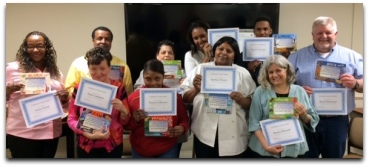“People will forget what you said, people will forget what you did, but people will never forget how you made them feel.”
–Maya Angelou
Everyone who attends “Camp Culture” at The Hermitage in Richmond (VA) literally carries Maya Angelou’s message with them when it’s time to go home.

There is no getting poison ivy or lost at this camp: Self-contained for six hours in a comfortable room away from all distraction, 10 staff team members and their facilitators relax and share about themselves, thoughts on home, and ideas for making life better for their residents at this CCRG. It’s proving to be an exhilarating means of introducing staff to the fundamentals of person-centered service.
Camp Culture is held one day each month for a different group of 10 team members. So far, 60 have attended. The goal is for the community’s entire team of 150 including part-time workers to attend, says Gale Knox, Executive Director.
The day begins with warm-up and team building exercises. Campers write down two truths and one lie about themselves. A facilitator reads what they’ve written to the other participants, who try to guess which statements are true. As campers begin to learn about one another, they feel more at ease and share more about themselves.
“They only share what they are comfortable sharing; we don’t ask them or pry … sometimes it feels like group therapy when they talk, and every session is different,” says Knox.
Meanwhile, the social worker takes positive information learned about each camper to a workshop across the hall where personalized, wooden frames are being constructed. Frames are stenciled with the individual camper’s name and adorned with pictures and words cut from magazines that describe him or her. Maya Angelou’s quote sets in the center of it all.
Back at camp, sessions designed to open participants’ minds and stimulate ideas are in progress:
- They are asked to write down what home means to them, and to imagine what be
 ing homeless feels like. And what about our residents: Do you think they feel more like the words you use to define “home,” or do they feel like “homeless?”
ing homeless feels like. And what about our residents: Do you think they feel more like the words you use to define “home,” or do they feel like “homeless?”
- Participants play “Dirty Word Jenga,” a game of identifying vocabulary that dehumanizes residents and encouraging more appropriate language.
- They imagine having a “gazillion dollars” to spend on making life better for residents at The Hermitage: what changes would they implement? Suggestions often become part of the organization’s person-centered strategy moving forward.
Facilitators include Knox, the director of health services, director of dining, business office manager and social worker. “I think it almost blows (session participants) away that we (formal leaders) are admitting that our current system may not be serving our residents well – it encourages them to think outside the box,” says Knox.
No one is called upon to speak, but tokens are given to team members who do. Those earning the most tokens get their choice of the prizes displayed on a table throughout the day, though the incentive to participate seems scarcely needed.
“By the end, they’re all fighting for the floor, but not because of the tokens; they just get caught up in the excitement,” says Knox.
Camp Culture concludes with the distribution of the newly-constructed, individualized frames to all participants. “It’s our way of showing team members that this is what it feels like to have someone care enough about you to get to know and pay attention to you. The reaction is just unbelievable when we pass the frames out,” says Knox.
One team member cried when presented with a frame that reflected her true self. “You really listened to me!” she told Knox. Many leave voicemails thanking her and ask if they can return for another day of camp.
Camp Culture “is probably one of our best accomplishments (in the initial steps toward person-centered care) … It’s a very honest, open day,” says Knox.


